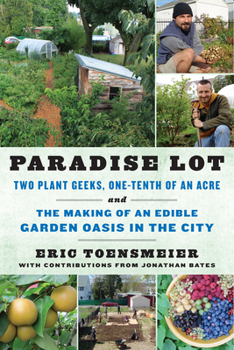Paradise Lot: Two Plant Geeks, One-Tenth of an Acre, and the Making of an Edible Garden Oasis in the City
In this vivid and engaging work, Eric Toensmeier entices us with his journey as an example, explaining what to do, and what mistakes to avoid, to develop our own versions of an edible urban paradise."--Toby Hemenway, author of Gaia's Garden When Eric Toensmeier and Jonathan Bates moved into a duplex in a run-down part of Holyoke, Massachusetts, the tenth-of-an-acre lot was barren ground and bad soil, peppered with broken pieces of concrete, asphalt, and brick. The two friends got to work designing what would become not just another urban farm, but a "permaculture paradise" replete with perennial broccoli, paw paws, bananas, and moringa--all told, more than two hundred low-maintenance edible plants in an innovative food forest on a small city lot. The garden--intended to function like a natural ecosystem with the plants themselves providing most of the garden's needs for fertility, pest control, and weed suppression--also features an edible water garden, a year-round unheated greenhouse, tropical crops, urban poultry, and even silkworms. In telling the story of Paradise Lot, Toensmeier explains the principles and practices of permaculture, the choice of exotic and unusual food plants, the techniques of design and cultivation, and, of course, the adventures, mistakes, and do-overs in the process. Packed full of detailed, useful information about designing a highly productive permaculture garden, Paradise Lot is also a funny and charming story of two single guys, both plant nerds, with a wild plan: to realize the garden of their dreams and meet women to share it with. Amazingly, on both counts, they succeed. "This is permaculture for the rest of us. Best of all, Paradise Lot is fun to read. It overflows with love--love of plants, love of land, love of adventuring on the edge of knowledge, and love of living. It's hard to put down. I read it in two large gulps."--Carol Deppe, author of The Resilient Gardener and Breed Your Own Vegetable Varieties
Format:Paperback
Language:English
ISBN:1603583998
ISBN13:9781603583992
Release Date:January 2013
Publisher:Chelsea Green Publishing Company
Length:240 Pages
Weight:0.92 lbs.
Dimensions:0.9" x 6.0" x 8.9"
Customer Reviews
1 rating
An excellent introduction to the concepts of permaculture with some advanced recommendations.
Published by Ryan , 2 years ago
Eric and Johnathan have done a great job of convincing anyone who reads this book to convert a bigger portion of their lawn and landscaping to growing food instead of ornamentals. Sometimes food plants fit both categories. Their recommendations are based on a temperate climate, for them the Northeastern US.





